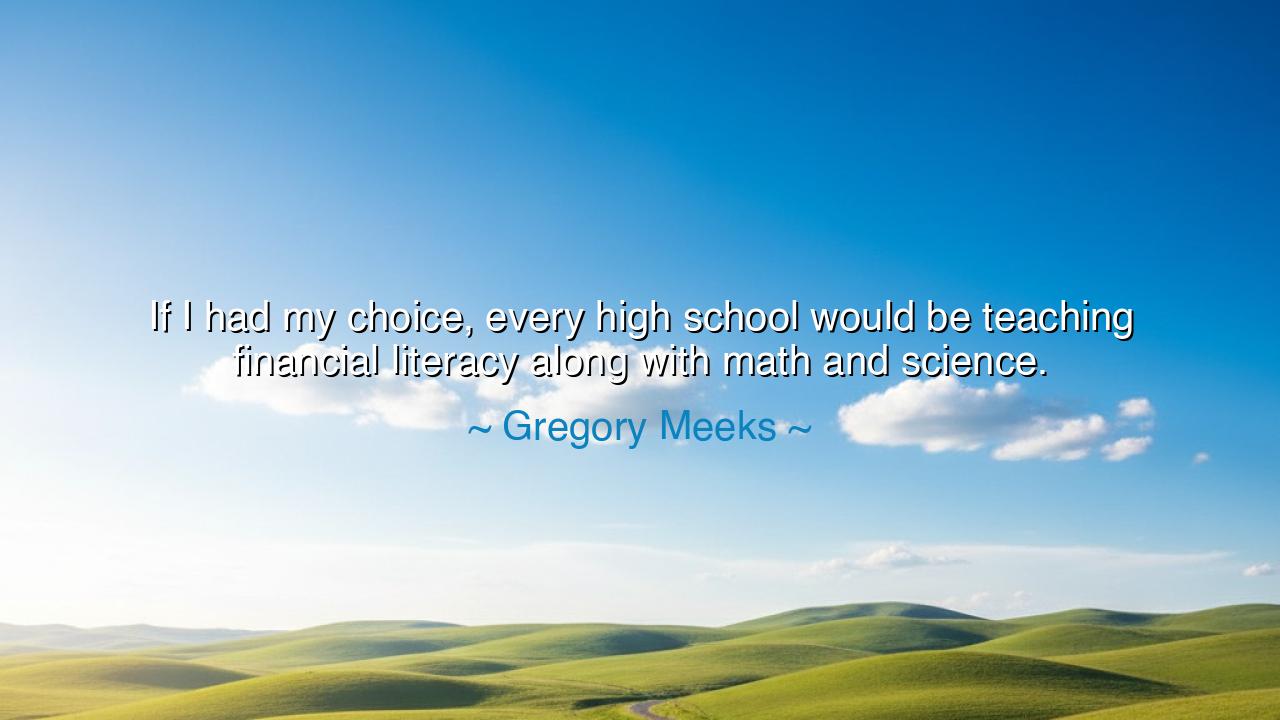
If I had my choice, every high school would be teaching financial
If I had my choice, every high school would be teaching financial literacy along with math and science.






Listen now, O seekers of wisdom, to the words of Gregory Meeks, who speaks with a profound understanding of the needs of our time: "If I had my choice, every high school would be teaching financial literacy along with math and science." In these words, Meeks highlights a truth that has been overlooked for too long—financial literacy is as essential to our lives as the understanding of numbers and science. To be educated in this world is not only to understand the laws of nature and the principles of mathematics but also to understand the systems that govern our everyday lives, our ability to thrive, and the choices we make regarding wealth, work, and resources.
In the ancient world, knowledge was not confined to abstract ideas but was always intertwined with the practical matters of life. The great philosophers like Plato and Aristotle taught that true education must serve both the mind and the body, preparing the individual to engage with society in meaningful ways. Aristotle, in his work on ethics, emphasized the importance of prudence—the ability to make wise decisions in the face of uncertainty. Financial decisions, then, have always been central to our well-being, even if the formal understanding of finance did not exist in the way we know it today. Meeks's call is simply an acknowledgment that the world has evolved, and the need to understand how to navigate wealth and resources is a matter of essential knowledge.
Consider the story of Cicero, the Roman statesman and philosopher, who was not only a master of rhetoric and philosophy but also a keen observer of the importance of practical affairs, including finance. While serving in public office, he understood the profound impact that economic decisions had on the well-being of the state. His writings on duty and public service were deeply informed by the understanding that leaders must be able to manage the resources of a nation wisely. If Cicero had lived in our time, he would surely have supported Meeks’s vision—teaching young minds the principles of managing their resources wisely so they may not only thrive personally but contribute to the flourishing of society.
Financial literacy, O wise ones, is not merely about balancing a checkbook or learning how to make investments. It is about understanding the systems that govern wealth—how markets operate, how economies grow, and how one can make decisions that ensure not only individual success but societal prosperity. Meeks speaks of a time when knowledge of math and science are indispensable to a modern education, but he points to the overlooked need to prepare young people for the world of finance. For just as science helps us understand the natural world, financial literacy helps us navigate the world we live in—empowering us to make informed choices that impact our lives and the lives of those around us.
Let us look, O wise ones, to the example of Benjamin Franklin, who, though known for his inventions and scientific pursuits, also understood the importance of financial wisdom. His famous saying, "A penny saved is a penny earned," speaks to the practical and sensible approach to money that he believed should be part of every individual’s education. Franklin’s emphasis on thrift, prudence, and long-term planning is the kind of financial literacy that Meeks advocates for—teaching people not just how to earn, but how to manage, save, and invest wisely for the future.
Yet, today, too many of our young minds are unprepared for the practical challenges of managing money, of making decisions that shape their financial futures. In a world where debt and financial instability are ever-present threats, financial literacy is more crucial than ever. It is a skill that shapes the very foundation of a person’s future—whether they will enter adulthood with confidence or be burdened by the weight of financial ignorance. The young mind must be taught not only the abstract concepts of math and science but also the practical knowledge of how to manage resources, make wise decisions, and understand the economic forces that shape their world.
So, the lesson, O wise ones, is this: true education is not confined to the abstract; it must prepare the individual for the world they will inhabit. Meeks’s vision calls for the inclusion of financial literacy in the curriculum, alongside math and science, because the choices we make with our resources will determine our well-being and the prosperity of our societies. It is not enough to teach the mind to understand the world through the lens of science alone—we must also teach it how to navigate the practical realities of wealth, economics, and finance. As we shape the minds of future generations, let us guide them not only in the realm of theory, but in the practical wisdom that will allow them to thrive in a world that demands both intellect and financial insight.
Thus, O wise ones, let us act to ensure that the education of our youth is whole—that they are not only equipped with the tools to understand the world through science but also prepared to master the world of finance. For it is through knowledge of both that they will be empowered to make choices that bring them success, stability, and fulfillment. Let us teach financial literacy alongside the sciences, for it is not enough to understand the world—we must also understand how to live wisely and prosperously within it.






AAdministratorAdministrator
Welcome, honored guests. Please leave a comment, we will respond soon